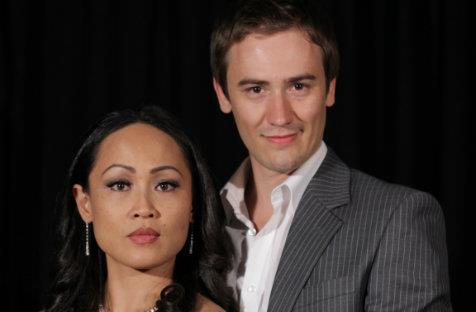As modern business speech has appropriated the language of the battlefield, Class Act Theatre has chosen to take the language of the battlefield and made it talk to us in the context of the boardroom.
Using a drab, anonymous setting, Director Stephen Lee has his company of players flex their dramatic muscles in an innovative version of The Scottish Play. While hewing to the traditional dialogue, characters use smart phones, computers and other modern paraphernalia to communicate news and developments. Speaker phones are used instead of errand boys, a tweet arrives to deliver an update on battle preparations, text messages are read out from handsets and a laptop is used to monitor Lady Macbeth’s sleepwalking habits. Technology is used thoughtfully and sympathetically with the play’s key plot developments, and works with the modern day costuming to bring the major themes of the play together for modern day audiences who are familiar with Shakespearian language.
Macbeth (Nick Maclaine) used the intimate space effectively, working the stages of his progress from the confident executive’s demeanour of the opening scenes to the guilt-ridden, doubt-stricken desperado who clutches at the rotten straws of prophecy. His interactions with all other characters rang true both in the well-known role of Macbeth the Warrior-King, as well as a contemporary financial sector bigwig. Rhoda Lopez was not distracted by her smaller part as one of the bag-lady witches, delivering a callously ambitious Lady Macbeth. Initially appearing as a glamorous trophy wife, she took advantage of the strong speeches to impress with her cool calculations and determination to advance in the social order, whether of ancient Scotland or of the 21st Century globalised boardroom.
Stephen Lee was a highlight amongst ‘The Company’, serving up a Duncan who was the perfect boss/King, throwing the impetuous madness of the Macbeths into sharper relief. Patrick Whitelaw’s boffin Banquo was a delight, and Kyle Sargon’s Macduff kept the tension high and the action believable in the final showdown.
Events felt more immediate with the starkly simple sets, which could have been anywhere at all. However, dimming the lighting to signal darkness and night hours would have been better teamed with some other device, as there was little to engage the audience attention for long scenes – although, I did find it all the more impressive that the actors coped with so few props to assist!
Class Act Theatre’s current version of Macbeth is not the ideal introduction for anyone with little knowledge of Shakespearean idiom or ignorant of the original storyline, as the combination of minimalist contemporary setting with the densely constructed wordplay is likely to baffle. It is, however, ideal for those who are familiar with classic treatments of the play, whether in written, film or traditional performance form, and it would be particularly recommended to schools to enrich their students’ understanding of Shakespearean tragedy in a compelling way.
Rating: 4 stars out of 5
Macbeth
By William Shakespeare
Presented by Class Act Theatre
Directed by Stephen Lee
Producer: Angelique Malcolm
Stage Manager: Stephen Lee
Costume: Shirley Van Sanden
Lighting Design: Aaron Stirk
Artwork: Alex Manfrin
Make up & Special Effects: Cadence Tait
Publicity: Rhoda Lopez
Performed by: Nick Maclaine, Rhoda Lopez, Angelique Malcolm, Shirley Van Sanden, Kyle Sargon, Daniel Buckle, Stephen Lee and Patrick Whitelaw
Subiaco Arts Centre Studio, Subiaco
10 – 14 September 2013





